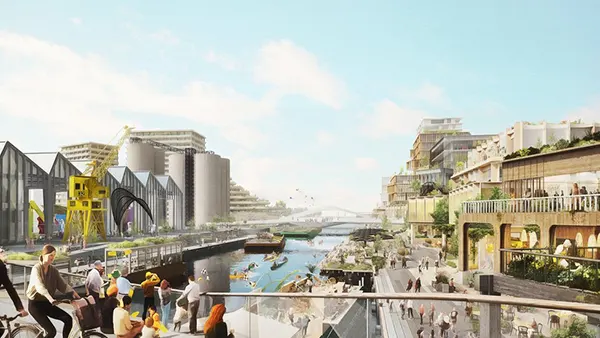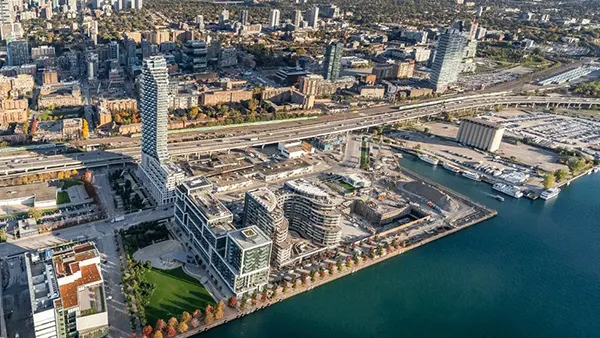Sidewalk Labs is an urban innovation firm created by Alphabet, the parent company of Google, with the goal of transforming cities through advanced technology. The aim is to address major urban challenges such as congestion, pollution, and affordable housing. The firm’s vision of a “smart city” proposes a more efficient, sustainable, and people-centric urban environment, where cutting-edge technology drives city planning and daily operations. This article explores the concept of Sidewalk Labs, its technological foundations, and the challenges it has faced, particularly in the Quayside project in Toronto.
What is Sidewalk Labs?
Sidewalk Labs was created with a clear mission: to redefine the future of cities by integrating technology into every aspect of urban living. By using data, sensors, and IoT devices, the company hopes to solve long-standing urban issues, enhance the quality of life for residents, and create more sustainable and efficient cities. The idea of a smart city is central to Sidewalk Labs’ philosophy, where urban spaces function as living ecosystems powered by data and technology.
The first major project undertaken by Sidewalk Labs was the Quayside development in Toronto. This initiative aimed to transform a large area of the city into a state-of-the-art urban environment, utilizing data-driven designs to improve everything from traffic flow to waste management. The project sought to showcase how technology could be used to optimize urban infrastructure, reduce carbon emissions, and improve the overall living experience in cities. However, the project faced significant obstacles, including issues related to privacy concerns and public opposition.
Despite the challenges, Sidewalk Labs continued to explore the potential of smart cities, looking for other opportunities to implement their vision. The concept of a smart city is appealing because it promises a more sustainable and efficient way of living. It focuses on the integration of renewable energy sources, data analytics, and automation to create cities that are both environmentally friendly and responsive to the needs of their inhabitants. Sidewalk Labs continues to refine its approach, aiming to find the right balance between innovation and public trust.
The Origins and Vision of Sidewalk Labs
The concept of Sidewalk Labs was born out of Alphabet’s larger vision to address urban challenges using innovative technologies. The company’s vision is to create environments that use data and technology to meet the needs of a growing global population while minimizing environmental impact. The idea was not just to create a high-tech city but to rethink how cities should operate, with a focus on efficiency, sustainability, and improving the human experience in urban environments.
Sidewalk Labs aims to develop cities that are flexible and adaptable to future needs. The integration of smart technologies into the urban environment, such as IoT devices and sensors, would allow for the real-time collection and analysis of data. This data would help urban planners make better decisions about traffic, waste, and energy use, making the city more responsive to its residents’ needs. By applying this data-driven approach, Sidewalk Labs hopes to make cities smarter, more efficient, and ultimately more livable.
One of the primary objectives of Sidewalk Labs is to reduce the environmental impact of cities. The company advocates for the use of renewable energy sources, such as solar power and wind energy, and smart grids to optimize energy distribution. Sidewalk Labs also envisions the widespread use of green infrastructure, such as rainwater harvesting systems, green roofs, and energy-efficient buildings. The goal is to create a city that reduces its carbon footprint and becomes a model for sustainable urban living.
Technology at the Heart of Sidewalk Labs
Sidewalk Labs believes that technology is the key to solving many of the problems faced by modern cities. By integrating advanced infrastructure and smart systems, the company aims to create urban spaces that are more efficient and environmentally friendly. The use of sensors, automation, and renewable energy sources forms the backbone of Sidewalk Labs’ vision for the future of urban living. These technologies would enable cities to run more smoothly, from traffic management to waste collection, and help residents live in more sustainable environments.
One of the key components of Sidewalk Labs’ technology is the smart infrastructure that would be built into cities. This includes sensors embedded in buildings, roads, and public spaces that would collect data on everything from air quality to traffic patterns. This data would be used to optimize city systems and improve the efficiency of urban living. For example, smart traffic lights could be adjusted in real-time to reduce congestion, while automated systems could be used to monitor and manage waste and energy use in real-time.
In addition to smart infrastructure, Sidewalk Labs is exploring the use of autonomous vehicles and other forms of smart transportation to improve the flow of people and goods in cities. Autonomous electric vehicles would be able to reduce congestion and provide a more efficient means of transportation, while reducing the environmental impact of traditional transportation systems. The goal is to create a system of transportation that is sustainable, efficient, and accessible to all residents, reducing the reliance on private cars and making cities more pedestrian-friendly.
Smart Infrastructure and Data-Driven Solutions
At the heart of the Sidewalk Labs vision is the integration of smart infrastructure into urban planning. The use of sensors, IoT devices, and data analytics allows for continuous optimization of city services and systems. Sidewalk Labs envisions a city that is responsive to the needs of its residents in real-time, with data driving decision-making and resource management. For example, the city could adjust its energy consumption based on demand, reducing waste and promoting sustainability. Additionally, the collection of data would allow for smarter management of traffic, waste, and public services, ultimately leading to a more efficient and liveable urban environment.
Another important aspect of smart infrastructure is the focus on sustainability. Sidewalk Labs aims to create a city that is powered by renewable energy sources, such as solar power and wind energy. The use of smart grids would allow for the efficient distribution of energy, ensuring that it is used where it is needed most. Additionally, green infrastructure, such as rainwater harvesting systems and green roofs, would be implemented to reduce the environmental impact of the city and improve the quality of life for its residents. These initiatives would help create a city that is not only technologically advanced but also sustainable and environmentally responsible.
Data collection and analysis are essential components of Sidewalk Labs’ approach to smart cities. By collecting real-time data from sensors and other devices, the city could monitor and adjust its systems to improve efficiency and sustainability. This would allow for better management of resources, such as energy, water, and waste, and ensure that the city’s infrastructure remains responsive to the needs of its residents. In this way, Sidewalk Labs hopes to create a city that is both high-tech and sustainable, with a focus on improving the quality of life for its inhabitants.

Controversies and Challenges of the Sidewalk Labs Project
While the Sidewalk Labs project has attracted a great deal of attention for its ambitious goals, it has also faced significant challenges and controversies. One of the primary concerns has been the issue of data privacy. The collection of vast amounts of personal data through sensors and IoT devices raised questions about how this data would be used and who would have access to it. Critics worried that the project could lead to increased surveillance and the erosion of privacy, especially given Google’s track record of collecting and using personal information for advertising purposes.
Furthermore, the public’s concerns about privacy and data security ultimately led to the project being paused. In 2020, Sidewalk Labs announced that it would halt its plans for the Quayside development, citing the complexity of the project and the public backlash regarding data privacy. While the company stated that it would continue to explore the potential of smart cities, the cancellation of the Quayside project highlighted the challenges of implementing such an ambitious initiative in a city with existing governance frameworks and concerns about privacy.
In addition to privacy concerns, the Sidewalk Labs project faced opposition from local governments and residents who questioned the role of private companies in urban development. Some critics argued that allowing a corporation like Google to control a significant portion of urban infrastructure and data could undermine public trust and democratic governance. These concerns led to debates about the role of tech companies in shaping the cities of the future, and whether their influence should be limited to avoid potential conflicts of interest. Despite these challenges, Sidewalk Labs continues to refine its approach to smart cities, aiming to address these concerns in future projects.
Privacy and Data Security Concerns
One of the biggest challenges faced by the Sidewalk Labs project was the issue of privacy and data security. The idea of a city powered by sensors and data collection raised concerns about surveillance and the potential misuse of personal information. Critics feared that residents would be constantly monitored, and their data could be used without proper consent or safeguards. These concerns were exacerbated by the fact that the project was backed by Google, a company with a history of collecting vast amounts of personal data for advertising purposes. As a result, privacy advocates and residents raised alarms about the potential for invasive surveillance and the lack of clear regulations surrounding data use.
In response to these concerns, Sidewalk Labs emphasized the importance of transparency and public engagement. The company pledged to adhere to strict privacy standards and ensure that data collection would be done in a responsible and ethical manner. However, the public’s concerns were not fully alleviated, and many people continued to question the project’s implications for privacy. This controversy played a major role in the decision to halt the Quayside development and put the future of the project in jeopardy.
As technology continues to play a larger role in urban development, the issue of data privacy will remain a critical concern. Cities of the future will need to balance the benefits of data-driven innovations with the need to protect residents’ personal information. The lessons learned from the Sidewalk Labs project will likely inform the development of future smart city initiatives, as cities around the world look for ways to use technology to improve urban living while ensuring that privacy and security are not compromised.

